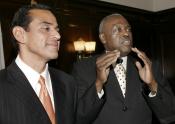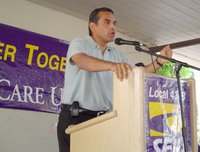 I’m a fan of The Who, and have always felt the need to turn up the volume for Won’t Get Fooled Again. When I read the Howard Blume article, L.A. mayor, new schools chief on the same page in the Times today I felt the urge to pick up my guitar and play, just like yesterday… Well, you get the idea.
I’m a fan of The Who, and have always felt the need to turn up the volume for Won’t Get Fooled Again. When I read the Howard Blume article, L.A. mayor, new schools chief on the same page in the Times today I felt the urge to pick up my guitar and play, just like yesterday… Well, you get the idea. Howard Blume reports in the article that recently hired LAUSD Superintendent David Brewer and L.A. Mayor Antonio Villaraigosa held a press conference after the first of their regularly scheduled weekly meetings – a good idea (the meetings, not the press conference) that could have been accomplished without the Mayor’s LAUSD “takeover” bill, (bearing the lofty title:) The Gloria Romero Educational Reform Act of 2006. Reportedly, the Superintendent and the Mayor are simpatico on their education agenda which includes (long pause for affect) more taxpayer funds for LAUSD, oh yeah… and more accountability for the district (which in California means additional taxpayer funds and the horrible experience of being labeled a “high priority” school).
Howard Blume reports in the article that recently hired LAUSD Superintendent David Brewer and L.A. Mayor Antonio Villaraigosa held a press conference after the first of their regularly scheduled weekly meetings – a good idea (the meetings, not the press conference) that could have been accomplished without the Mayor’s LAUSD “takeover” bill, (bearing the lofty title:) The Gloria Romero Educational Reform Act of 2006. Reportedly, the Superintendent and the Mayor are simpatico on their education agenda which includes (long pause for affect) more taxpayer funds for LAUSD, oh yeah… and more accountability for the district (which in California means additional taxpayer funds and the horrible experience of being labeled a “high priority” school).Will there be any real accountability? According to Howard Blume, Superintendent Brewer tipped his hand on this front by continuing to “soft-pedal earlier remarks about his willingness to fire bad teachers.” In fact, according to the Times reporter the Superintendent, “talked of "embracing" teachers by giving them necessary training, due process and even rewards and community sponsored incentives, such as coupons and free classroom supplies. When pressed several times on how long ineffective teachers would be given to improve, he declined to say.”
I’m not one for firing people for the sake of firing, but there needs to be less coddling and more cajoling if LAUSD is going to change its culture from one of continued failure to one of success. At some point the district will need to use student test data to determine where academic success is occurring and where it isn’t. Where academic failure is systemic, teachers either need to learn how to teach or find a career for which they are better suited. The same level of professional and personal accountability needs to be applied to principals and other administrators. If things do not change, there needs to be accountability for the entire district. Perhaps better options should be explored like breaking LAUSD into smaller more manageable (and more accountable) districts; or better yet, providing parents and students the option to attend better schools by allowing them the choice to escape from the failing government schools.
 The modicum of improvement LAUSD has enjoyed in recent years has been most prominently influenced by the adoption of statewide academic standards and standards-aligned testing. Superintendent Romer did a yeoman’s job of implementing policies to improve the delivery of standards-based curriculum, and I suppose Admiral Brewer will do at least as good a job (after all, he is an Admiral). But, anyone who was hoping for a revolution led by Mayor Villaraigosa through the Gloria Romero Educational Reform Act of 2006 – well... just crank up The Who, that rockin’ band who emphatically belted out the lyrics, “I'll tip my hat to the new constitution. Take a bow for the new revolution. Smile and grin at the change all around. Pick up my guitar and play. Just like yesterday. Then I'll get on my knees and pray. We don't get fooled again.”
The modicum of improvement LAUSD has enjoyed in recent years has been most prominently influenced by the adoption of statewide academic standards and standards-aligned testing. Superintendent Romer did a yeoman’s job of implementing policies to improve the delivery of standards-based curriculum, and I suppose Admiral Brewer will do at least as good a job (after all, he is an Admiral). But, anyone who was hoping for a revolution led by Mayor Villaraigosa through the Gloria Romero Educational Reform Act of 2006 – well... just crank up The Who, that rockin’ band who emphatically belted out the lyrics, “I'll tip my hat to the new constitution. Take a bow for the new revolution. Smile and grin at the change all around. Pick up my guitar and play. Just like yesterday. Then I'll get on my knees and pray. We don't get fooled again.”
 Pacific Research Institute's
Pacific Research Institute's








